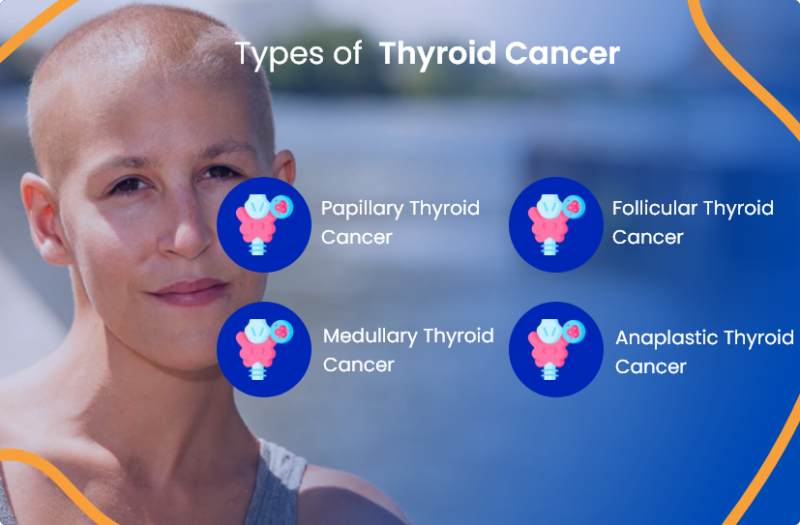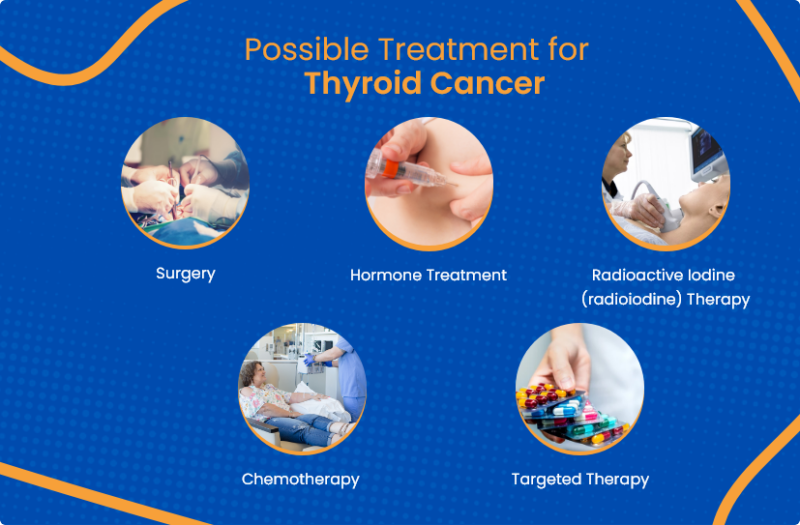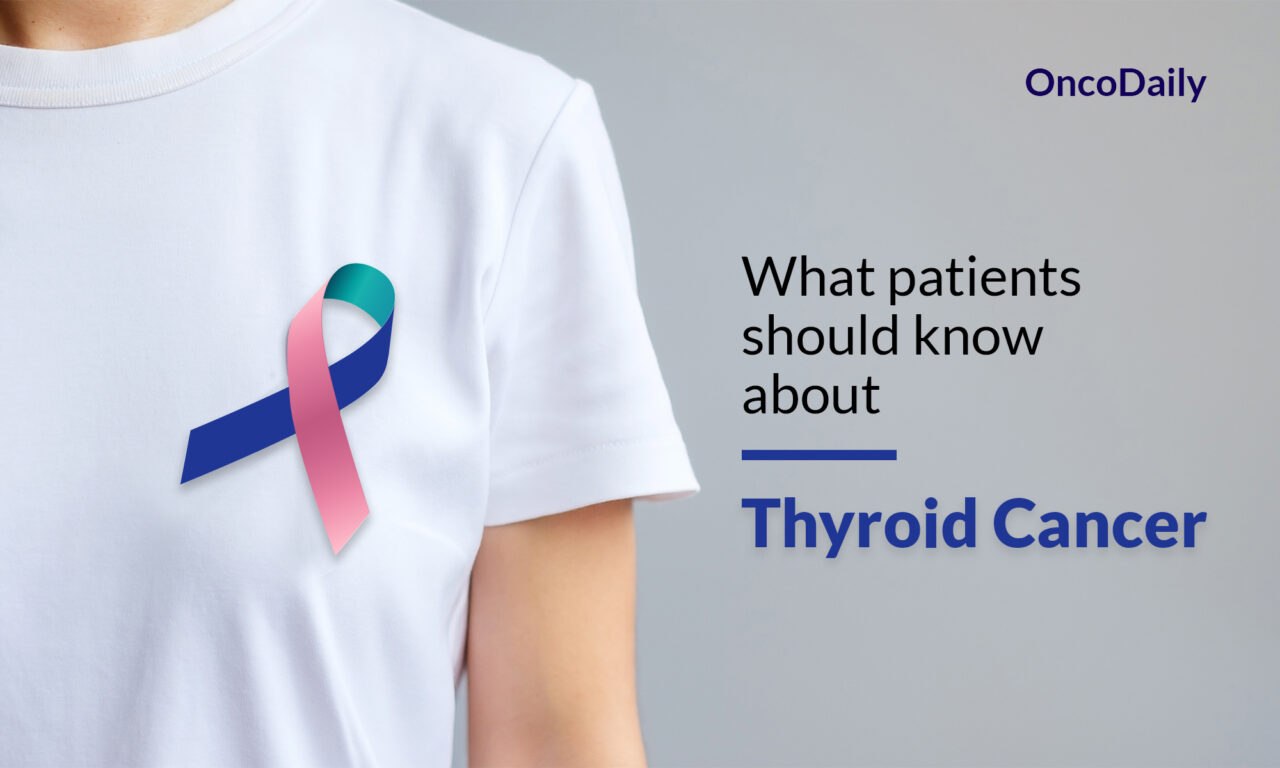Introduction
Thyroid cancer is a type of cancer that starts in the thyroid gland, a small, butterfly-shaped gland located at the base of the neck. This gland produces hormones that regulate the body’s metabolism, heart rate, and body temperature. Thyroid cancer is generally highly treatable, especially when detected early. This article aims to provide patients with a comprehensive understanding of thyroid cancer, including its causes, risk factors, subtypes, symptoms, diagnosis, prevention, prognosis, treatment options, and survivorship.
Causes and Risk Factors
Causes
The exact cause of thyroid cancer is not always clear. It occurs when cells in the thyroid undergo genetic changes (mutations) that cause them to grow and multiply uncontrollably. These abnormal cells can form a tumor and may spread to other parts of the body.
Risk Factors
Several factors can increase the risk of developing thyroid cancer:
- Gender and Age: Thyroid cancer is more common in women than in men. Women often develop it in their 40s and 50s, while men are more likely to develop it in their 60s and 70s.
- Radiation Exposure: Exposure to high levels of radiation, such as radiation therapy to the head and neck or fallout from nuclear accidents, can increase the risk.
- Family History: A family history of thyroid cancer or certain genetic syndromes can increase the risk.
- Iodine Deficiency: A diet low in iodine can increase the risk of certain types of thyroid cancer.
- Other Factors: Being overweight or obese, having a history of thyroiditis (inflammation of the thyroid), and certain hereditary conditions can also increase the risk.
Subtypes and Syndromic Cancers
Subtypes
There are several types of thyroid cancer, each with different characteristics and treatment approaches:
- Papillary Thyroid Cancer: The most common type, accounting for about 80% of cases. It generally grows slowly and often spreads to lymph nodes in the neck.
- Follicular Thyroid Cancer: The second most common type, making up about 10-15% of cases. It can spread to other parts of the body, such as the lungs and bones.
- Medullary Thyroid Cancer (MTC): A rare type that accounts for about 3% of cases. It can be associated with genetic syndromes like Multiple Endocrine Neoplasia (MEN) type 2.
- Anaplastic Thyroid Cancer: A very rare and aggressive type that accounts for less than 2% of cases. It tends to grow rapidly and is difficult to treat.
- Thyroid Lymphoma and Sarcoma: Extremely rare types that originate from the immune system cells or connective tissue cells in the thyroid.

This image is taken from actchealth.com
Syndromic Cancers
Certain genetic syndromes can increase the risk of thyroid cancer:
- Multiple Endocrine Neoplasia (MEN) type 2: This syndrome increases the risk of medullary thyroid cancer and other types of tumors.
- Familial Adenomatous Polyposis (FAP): This condition increases the risk of papillary thyroid cancer.
- Cowden Syndrome: This syndrome is associated with an increased risk of both papillary and follicular thyroid cancers.
- Werner Syndrome: This rare condition increases the risk of follicular and anaplastic thyroid cancers.
Symptoms
Thyroid cancer often does not cause any symptoms in its early stages. However, as the cancer grows, it may cause a variety of symptoms. Understanding why these symptoms occur can help patients recognize them and seek timely medical attention.
Lump or Swelling in the Neck
Reason: A lump or swelling in the neck is one of the most common symptoms of thyroid cancer. This occurs because the thyroid gland, located at the base of the neck, develops a tumor or nodule. As the tumor grows, it becomes more noticeable and can be felt through the skin.
Hoarseness or Changes in the Voice
Reason: Hoarseness or changes in the voice can occur when a thyroid tumor presses against the nerves that control the vocal cords. The recurrent laryngeal nerve, which runs close to the thyroid gland, can be affected, leading to voice changes such as hoarseness, breathiness, or a rough voice.
Difficulty Swallowing
Reason: Difficulty swallowing, also known as dysphagia, can happen when a thyroid tumor grows large enough to press against the esophagus, the tube that carries food from the mouth to the stomach. This pressure can make it hard to swallow solid foods and, in severe cases, even liquids.
Difficulty Breathing
Reason: Difficulty breathing can occur if a thyroid tumor presses against the trachea (windpipe). This can cause a sensation of tightness or constriction in the throat, making it feel like breathing through a straw. In severe cases, it can lead to significant breathing difficulties.
Pain in the Neck or Throat
Reason: Pain in the neck or throat can be caused by the growth of the thyroid tumor. As the tumor enlarges, it can cause discomfort or pain in the surrounding tissues. This pain may sometimes radiate to the ears.
Swollen Lymph Nodes in the Neck
Reason: Swollen lymph nodes in the neck can occur if thyroid cancer spreads to the lymphatic system. The lymph nodes are part of the body’s immune system and can become enlarged when they contain cancer cells. This swelling is often painless but noticeable as lumps in the neck.
Persistent Cough Not Related to a Cold
Reason: A persistent cough that is not related to a cold or other respiratory infection can be a symptom of thyroid cancer. This occurs when a thyroid tumor irritates the trachea or the surrounding tissues, leading to a chronic cough.
Additional Symptoms
While the above symptoms are the most common, thyroid cancer can also cause other symptoms depending on the type and stage of the cancer:
- Fatigue: General tiredness and lack of energy can occur, although this is a non-specific symptom and can be caused by many other conditions.
- Unintended Weight Loss: This can happen if the cancer affects the body’s metabolism or if the patient has difficulty eating due to swallowing problems.
- Hyperthyroidism Symptoms: In rare cases, cancer can cause the thyroid to produce too much hormone, leading to symptoms like rapid heartbeat, weight loss, and nervousness.
Diagnosis
Physical Examination
A physical examination may be performed to check for lumps or swelling in the neck. The doctor may also ask about the patient’s medical history and any symptoms they are experiencing.
Blood Tests
Blood tests can measure levels of thyroid hormones and other substances that may indicate thyroid cancer. For example, elevated levels of calcitonin can suggest medullary thyroid cancer.
Imaging Tests
Imaging tests such as ultrasound, CT scans, and MRI can help visualize the thyroid and detect any abnormalities. Ultrasound is commonly used to examine the thyroid and surrounding tissues.
Biopsy
A biopsy involves taking a small sample of tissue from the thyroid nodule. This is usually done using a fine needle aspiration (FNA) technique. The sample is then examined under a microscope to check for cancer cells.
Prevention
While it is not always possible to prevent thyroid cancer, certain measures can help reduce the risk:
- Avoid Radiation Exposure: Limit exposure to radiation, especially in childhood. This includes avoiding unnecessary medical imaging tests that use radiation.
- Maintain a Healthy Diet: Ensure adequate iodine intake through a balanced diet. Iodine is essential for normal thyroid function.
- Genetic Counseling and Testing: Individuals with a family history of thyroid cancer or genetic syndromes associated with thyroid cancer may benefit from genetic counseling and testing.
Prognosis
The prognosis for thyroid cancer is generally very good, especially when it is detected early. However, the prognosis can vary depending on the type of thyroid cancer, the stage at diagnosis, and the patient’s overall health.
- Papillary and Follicular Thyroid Cancers: These types have an excellent prognosis, with high survival rates.
- Medullary Thyroid Cancer: The prognosis is good if detected early but can be more challenging if it has spread.
- Anaplastic Thyroid Cancer: This type has a poor prognosis due to its aggressive nature and rapid growth.
Treatment and Side Effects
Surgery
Surgery is the most common treatment for thyroid cancer. It involves removing part or all of the thyroid gland (thyroidectomy). If the cancer has spread to lymph nodes, these may also be removed.
Side Effects: After surgery, patients may need to take thyroid hormone replacement pills for life. Other side effects can include changes in voice, difficulty swallowing, and low calcium levels if the parathyroid glands are also removed.
Radioactive Iodine Therapy
Radioactive iodine therapy is used to destroy any remaining thyroid tissue or cancer cells after surgery. It is particularly effective for papillary and follicular thyroid cancers.
Side Effects: Side effects can include nausea, neck pain, dry mouth, and changes in taste. Rarely, it can affect fertility in men and women.
External Radiation Therapy
External radiation therapy uses high-energy rays to target and kill cancer cells. It is often used for anaplastic thyroid cancer or when surgery is not an option.
Side Effects: Side effects can include fatigue, skin changes, dry mouth, and difficulty swallowing.
Chemotherapy
Chemotherapy is not a very common treatment for thyroid cancer, but it may sometimes be used in certain situations:
- For anaplastic thyroid cancer (an aggressive subtype), chemotherapy may be combined with radiation therapy to try to control the cancer.
- For advanced or metastatic thyroid cancers that are no longer responding to other treatments like radioactive iodine or targeted therapies.
Potential Side Effects:
Like other cancer treatments, chemotherapy can cause side effects by damaging some healthy cells along with the cancer cells. Common side effects may include:
- Hair loss
- Nausea and vomiting
- Loss of appetite
- Fatigue
- Increased risk of infections due to low white blood cell counts
- Easy bruising or bleeding due to low platelet counts
- Mouth sores
- Diarrhea
Most of these side effects are temporary and will go away after treatment ends.
Targeted Therapy for Thyroid Cancer
Targeted therapy uses drugs that specifically target and interfere with the growth and spread of cancer cells while causing less harm to normal cells. Several targeted therapy drugs have been approved by the U.S. Food and Drug Administration (FDA) for the treatment of advanced thyroid cancers.
For Differentiated Thyroid Cancer (Papillary, Follicular, Hürthle Cell)
- Sorafenib and Lenvatinib are approved for advanced differentiated thyroid cancer that is no longer responding to radioactive iodine therapy.
- Larotrectinib and Entrectinib are approved for rare cases with an NTRK* gene fusion.
For Medullary Thyroid Cancer (MTC)
- Vandetanib and Cabozantinib are approved for advanced or metastatic MTC.
- Selpercatinib and Pralsetinib are approved for advanced MTC with a RET* gene mutation or fusion.
For Anaplastic Thyroid Cancer
- The combination of Dabrafenib and Trametinib is approved for anaplastic thyroid cancer with a BRAF* mutation.
*These genes regulate cell growth and division, mutations of these genes may lead to uncontrolled growth and replication of cells.
Potential Side Effects:
Common side effects of targeted therapies may include:
- Diarrhea
- Fatigue
- Skin rash or hand-foot syndrome (redness, pain, swelling of hands and feet)
- Nausea and vomiting
- Loss of appetite and weight loss
- High blood pressure
- Liver problems
- Increased risk of bleeding or blood clots

This image is taken from actchealth.com
Newest Options and Ongoing Trials
Research is ongoing to find new and more effective treatments for thyroid cancer. Clinical trials are testing new drugs, combinations of treatments, and innovative approaches such as immunotherapy. Patients may consider participating in clinical trials to access cutting-edge treatments and contribute to medical research.
More information about ongoing clinical trials can be found on clinicaltrials.gov
Patient Survivorship
Challenges After Treatment
Surviving thyroid cancer can bring its own set of challenges. Patients may face physical, emotional, and psychological difficulties after treatment. Common issues include:
- Hormone Replacement: Many patients need to take thyroid hormone replacement pills for life. Regular monitoring and dosage adjustments are necessary to maintain proper hormone levels.
- Emotional Impact: The experience of having cancer can lead to anxiety, depression, and fear of recurrence. Support from family, friends, and mental health professionals can be beneficial.
- Physical Changes: Surgery and other treatments can lead to physical changes such as scarring, changes in voice, and difficulty swallowing.
- Follow-Up Care: Regular follow-up appointments are essential to monitor for any signs of recurrence and manage any ongoing health issues.
This informative video is taken from Sylvester Comprehensive Cancer Center
Support and Resources
Support groups, counseling, and educational resources can help patients navigate life after cancer. Many organizations offer support services, including the American Cancer Society, Cancer Support Community, and Thyroid Cancer Survivors’ Association.
Conclusion
Thyroid cancer is a highly treatable disease with a generally good prognosis, especially when detected early. Understanding the risk factors, symptoms, and treatment options can empower patients to make informed decisions about their care. Ongoing research and clinical trials continue to improve the outlook for thyroid cancer patients. Survivorship brings its own challenges, but with proper support and follow-up care, patients can lead healthy and fulfilling lives.
Resources
- American Society of Clinical Oncology – cancer.net
- What Causes Thyroid Cancer and Is It Hereditary? – cancercenter.com
- American Cancer Society – cancer.org
- Risks and causes of thyroid cancer – cancerresearch.org
- Risk Factors for Thyroid Cancer: What Do We Know So Far? – PubMed
- Treatment Side Effects of Thyroid Cancer – cancersupportcommunity.org
- Cancer Predisposition Syndromes and Thyroid Cancer: Keys for a …
- Thyroid Cancer Symptoms & Diagnosis – cancer.columbia.edu
- Familial syndromes associated with thyroid cancer in the …


